Top Digital Marketing AI Tools to Boost Your Growth in 2025

The race to capture audience attention and drive conversions is more competitive than ever. Manually optimizing every campaign, personalizing every email, and analyzing every data point is no longer a viable strategy for growth. This is where artificial intelligence moves from a buzzword to a fundamental component of your marketing operations, solving the critical challenges of scale, speed, and precision. The right digital marketing AI tools automate repetitive tasks, uncover deep audience insights, and predict campaign outcomes, allowing your team to focus on strategy and creativity instead of getting bogged down in manual execution.
This resource is designed to cut through the noise and provide a direct, comprehensive guide to the most effective platforms available. We've gone beyond surface-level descriptions to deliver a detailed analysis of the top tools that can transform your marketing efforts in 2025. You won't find generic marketing copy here. Instead, you'll get a clear-eyed look at what each tool actually does, its specific strengths, potential limitations, and ideal use cases.
Inside this guide, you will find:
- Detailed breakdowns of leading platforms like Semrush, HubSpot, Jasper, and Adobe Marketo Engage.
- Practical insights into how to integrate these tools into your existing workflows for SEO, content creation, email marketing, and social media.
- Honest assessments of pricing structures and feature sets to help you make an informed investment.
Each entry includes screenshots for visual context and direct links, enabling you to explore the tools that best fit your specific business needs and strategic goals. Let’s dive into the platforms that will build your smarter marketing stack.
1. PromptDen
PromptDen stands out as a premier destination for digital marketers looking to harness the full potential of generative AI. It's a comprehensive, community-driven platform and marketplace focused on a critical, often-overlooked component of AI success: high-quality prompting. By providing a centralized hub for discovering, sharing, and monetizing prompts across a vast array of AI models, PromptDen addresses a core need for marketers aiming to produce consistent, high-impact content, visuals, and campaigns. It’s an essential tool for scaling creative and analytical tasks.
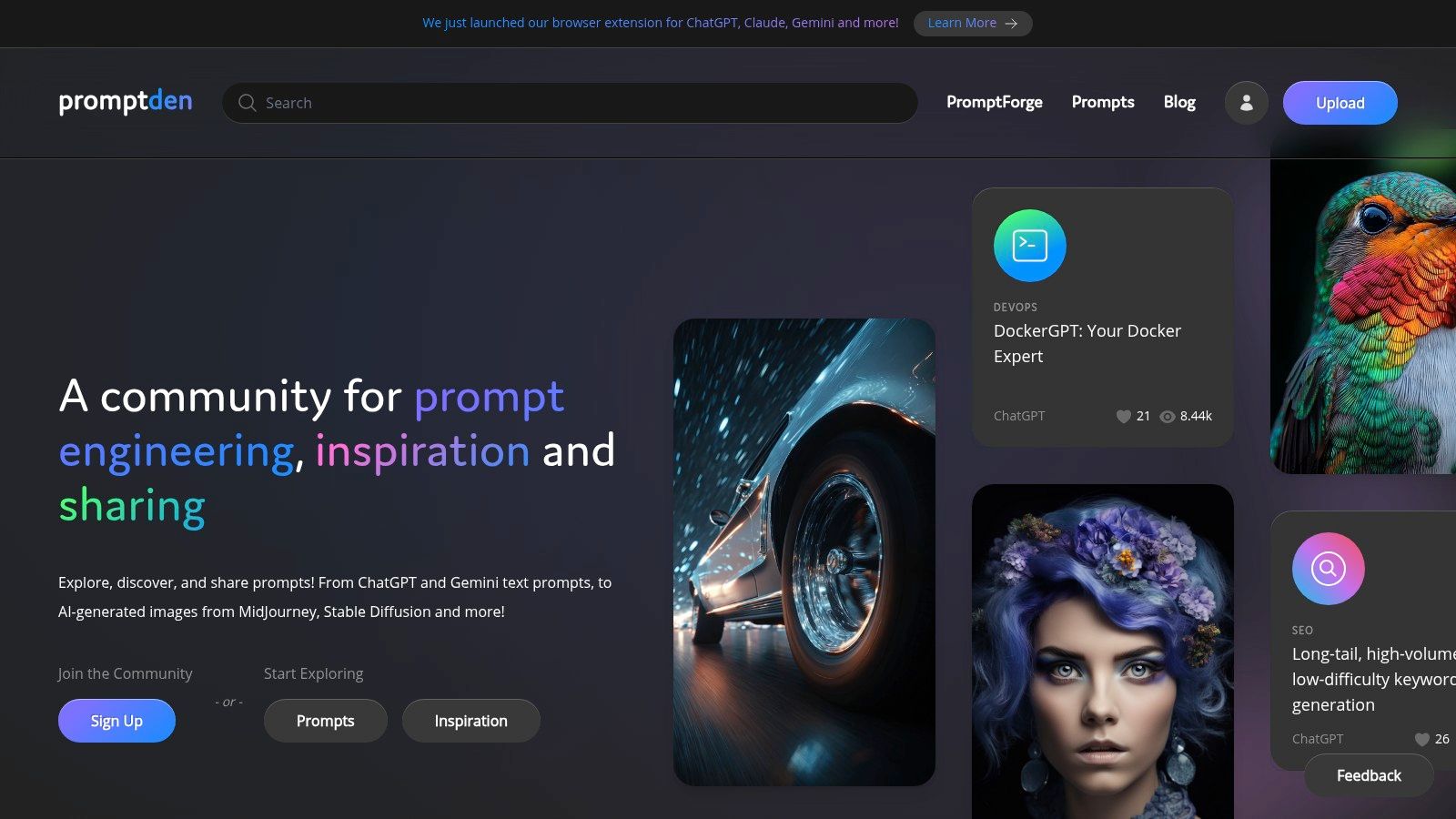
Unlike generic prompt libraries, PromptDen is a multi-modal powerhouse supporting text models like ChatGPT and Claude, image generators like Midjourney and DALL-E, and even video platforms like Veo. This versatility makes it an indispensable asset for a modern digital marketing team that needs everything from SEO-optimized blog posts and social media ad copy to unique brand imagery and video storyboards. The platform’s robust marketplace empowers creators to monetize their expertise, fostering a dynamic ecosystem where top-tier, battle-tested prompts are readily available.
Core Strengths for Digital Marketers
PromptDen's real value lies in its specialized features that directly streamline marketing workflows. The intuitive browser extensions for popular chat assistants allow for seamless integration, letting marketers test and deploy prompts without ever leaving their primary AI interface. The platform's educational resources, including the PromptForge tool and a detailed blog, are exceptional for team upskilling. For those looking to improve their skills, PromptDen offers a comprehensive guide on mastering prompt engineering.
Key Features and Considerations
- Multi-Modal Prompt Library: Access a vast, curated collection of prompts for text, image, and video generation, covering specific marketing needs from PPC ad copy to brand persona development.
- Integrated Marketplace: Buy and sell high-performing prompts and digital assets, allowing teams to either acquire proven formulas or monetize their own successful AI workflows.
- Browser Extensions: Integrate PromptDen directly into your chat-based AI tools for rapid testing and implementation, drastically cutting down on context switching.
- Community and Education: Engage with a community of creators, explore trending prompts sorted by categories like marketing and SEO, and utilize tools like PromptForge to refine your skills.
While the platform offers tremendous value, pricing is determined by individual sellers in the marketplace, which means costs can vary. New users may also need some time to explore the full breadth of features available.
Best for: Digital marketing teams, content creators, and SEO specialists seeking to scale their AI-driven content and creative production with proven, high-quality prompts.
2. Semrush
Semrush has long been a heavyweight in the SEO and SEM world, but its evolution into a comprehensive suite of digital marketing AI tools makes it an indispensable asset for data-driven marketers. While not a pure-play AI generator, it strategically infuses artificial intelligence into its core SEO, content, and competitive analysis features to provide actionable, data-backed recommendations. Its AI Writing Assistant, for example, goes beyond basic text generation by integrating directly with SEO analytics, ensuring content is optimized for specific keywords from the start.
This platform truly shines in its ability to blend massive datasets with practical AI. Users can leverage AI-powered topic research to uncover content gaps and generate clusters of related articles that satisfy search intent. The on-page SEO checker uses AI to analyze top-ranking competitors and provide a clear, prioritized list of improvements for your own content, from keyword usage to readability.
Key Features & Use Cases
- AI Writing Assistant: Directly integrates with Google Docs or WordPress to provide real-time SEO feedback, rephrasing suggestions, and tone adjustments. It helps ensure your content aligns perfectly with target keywords identified in its research tools.
- Topic Research Tool: Uses AI to analyze a core topic and generate a mind map of related subtopics, questions, and headline ideas, streamlining content strategy.
- PPC Keyword Tool: Automates keyword grouping and ad group creation for paid campaigns, saving hours of manual work.
Pricing & Onboarding
Semrush operates on a subscription model with three main tiers: Pro, Guru, and Business, starting at approximately $130 per month. Additional features like the App Center add-ons and extra user seats increase the cost. The platform has a steeper learning curve than simpler tools, but its extensive academy and knowledge base provide excellent resources for new users.
| Pro | Guru | Business |
|---|---|---|
| Best for: Freelancers, startups | Best for: SMBs & marketing agencies | Best for: Large agencies & enterprises |
| Price: ~$130/mo | Price: ~$230/mo | Price: ~$450/mo |
| Key AI Limit: Basic content AI features | Key AI Limit: Content Marketing Toolkit | Key AI Limit: Full API access |
Pros:
- Integrates AI with a deep, trusted SEO and competitive dataset.
- Offers an all-in-one toolkit for SEO, PPC, content, and social media.
Cons:
- Can be complex for beginners to navigate.
- The pricing model can become expensive with add-ons and additional users.
Website: https://semrush.com
3. HubSpot Marketing Hub
HubSpot has evolved from an inbound marketing pioneer into a comprehensive CRM platform where its digital marketing AI tools are deeply embedded within a unified data ecosystem. Rather than offering standalone AI generators, HubSpot integrates artificial intelligence directly into its Marketing Hub, allowing users to leverage customer data from sales and service interactions to inform their AI-powered marketing efforts. Its AI Content Assistant, for instance, can generate blog posts, social media updates, and marketing emails that are inherently aligned with a contact's journey.
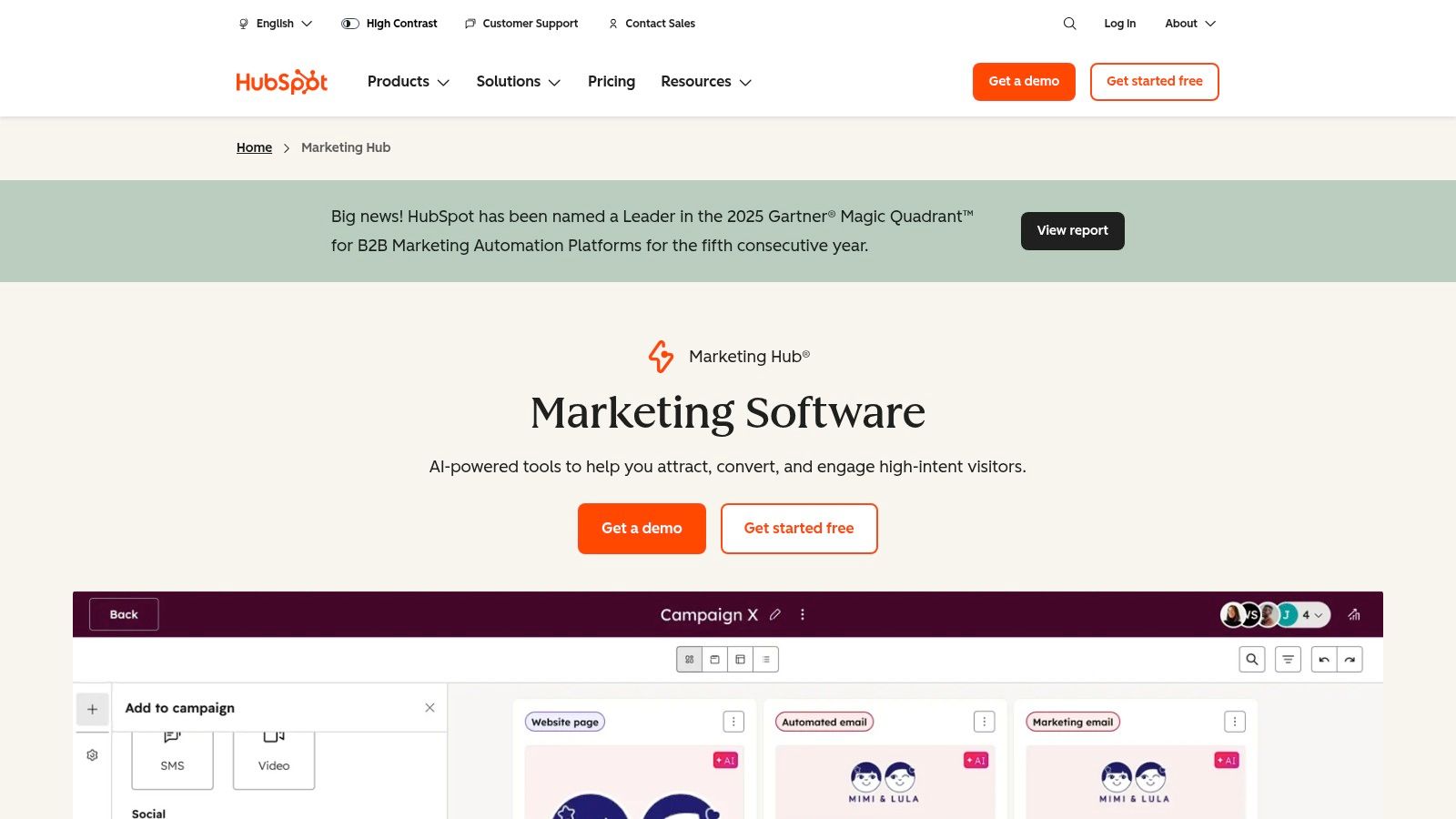
The platform's strength lies in this CRM-native approach. AI agents don't just create content in a vacuum; they can access lead scores, deal stages, and service tickets to generate hyper-relevant campaigns. This allows for sophisticated automation, where AI can draft a follow-up email based on a prospect’s recent website activity or generate a social post promoting a case study relevant to a specific industry segment you are targeting. It transforms AI from a simple content tool into a core component of a data-driven marketing engine.
Key Features & Use Cases
- AI Content Assistant: Generates entire blog posts, landing pages, and emails directly within the HubSpot editor, with options to rephrase, shorten, or expand text based on simple commands.
- Predictive Lead Scoring: Uses machine learning to analyze contact data and behavior, automatically identifying and prioritizing the most sales-ready leads for your team.
- AI-Powered Reporting: Helps uncover trends in your marketing data, suggesting which channels are providing the best ROI and identifying opportunities for campaign optimization.
- ChatSpot Integration: A conversational AI assistant that allows you to add contacts, run reports, and draft content using natural language prompts, streamlining marketing operations.
Pricing & Onboarding
HubSpot offers a range of tiers from free tools to enterprise-level plans, making it accessible for businesses of all sizes. The pricing is primarily based on the number of marketing contacts in your database. Higher-tier plans (Professional and Enterprise) require a mandatory, one-time onboarding fee. While the initial learning curve is gentle thanks to a clean UI, mastering the full suite requires dedication.
| Starter | Professional | Enterprise |
|---|---|---|
| Best for: Individuals & small businesses | Best for: Growing marketing teams | Best for: Large, scaling organizations |
| Price: ~$20/mo | Price: ~$890/mo | Price: ~$3,600/mo |
| Key AI Limit: Basic AI content creation | Key AI Limit: A/B testing & automation | Key AI Limit: Predictive lead scoring |
Pros:
- Unifies marketing, sales, and service data for smarter AI-driven campaigns.
- Highly scalable, with plans ranging from free to advanced enterprise features.
Cons:
- Contact-based pricing can become very expensive as your list grows.
- Mandatory onboarding fees for higher tiers are a significant upfront cost.
Website: https://hubspot.com/products/marketing
4. Jasper
Jasper has carved out its space as a premium digital marketing AI tool specifically engineered for marketing teams that prioritize brand consistency. Unlike general-purpose AI writers, Jasper is built around a core of brand governance, allowing businesses to create a "Brand Voice" by uploading style guides, product catalogs, and company facts. This ensures that every piece of content, from a social media post to a full campaign brief, remains on-brand and factually accurate.
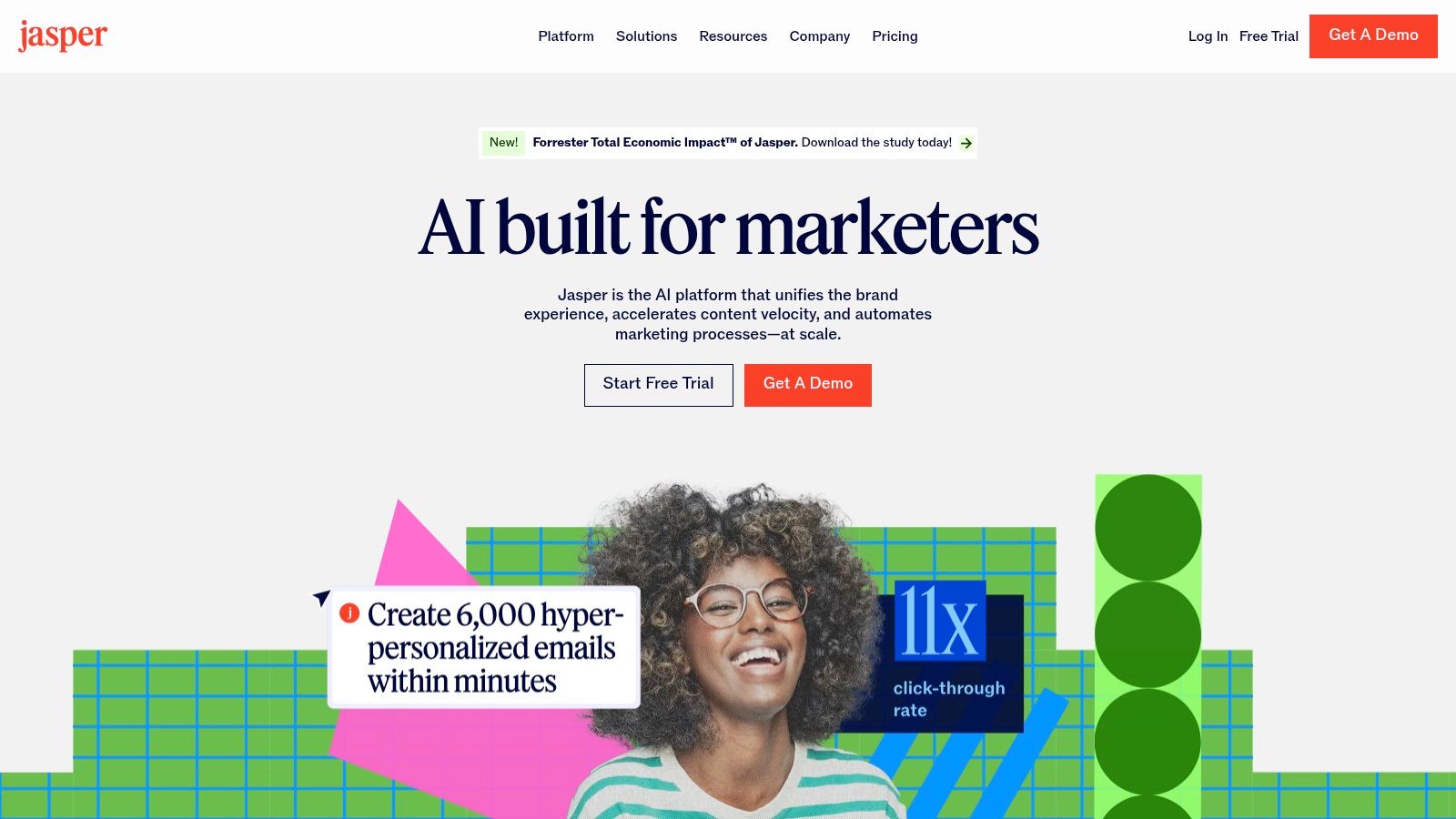
The platform's strength lies in moving beyond simple text generation to campaign orchestration. Using its Canvas feature, teams can map out and generate all the interconnected assets for an entire marketing campaign in one place. For advanced users, the Business plan introduces AI marketing Agents and a no-code AI app builder, allowing teams to create custom, repeatable workflows tailored to their specific marketing processes, a unique offering in the space.
Key Features & Use Cases
- Brand Voice & Knowledge: Upload brand guidelines, tone examples, and product information to create a centralized AI brain. This ensures all generated content is consistent and accurate.
- Campaign Canvas: A collaborative space to ideate, create, and refine all content assets for a multi-channel marketing campaign, from initial emails to final ad copy.
- AI Marketing Agents: Automate multi-step marketing tasks by building custom AI agents without code (Business plan only), streamlining repetitive content creation workflows.
Pricing & Onboarding
Jasper's pricing is user-seat-based, with Creator, Teams, and Business tiers. A 7-day free trial is available to test the platform's core functionalities. The Creator plan offers basic access, but the true power for marketing teams is unlocked in the Teams and Business plans, which include collaboration features and advanced brand controls.
| Creator | Teams | Business |
|---|---|---|
| Best for: Individuals & creators | Best for: Small marketing teams | Best for: Growing businesses & enterprises |
| Price: ~$49/user/mo | Price: ~$125/user/mo | Price: Custom |
| Key AI Limit: 1 Brand Voice | Key AI Limit: 3 Brand Voices, 10 campaigns | Key AI Limit: Unlimited features, AI Agents |
Pros:
- Excellent brand governance features ensure consistent and accurate AI output.
- Offers a 7-day free trial to explore the platform before committing.
Cons:
- The per-user pricing model can become costly for larger teams.
- The most powerful features, like AI Agents, are locked behind the custom-priced Business plan.
Website: https://jasper.ai
5. Copy.ai
Copy.ai positions itself not just as a content generator but as a comprehensive AI workflow platform for marketing and sales teams. It stands out among digital marketing AI tools by focusing on creating brand-specific content agents and automating repetitive go-to-market tasks. Instead of just producing generic text, it allows users to train AI on their brand voice, product information, and customer personas, ensuring all generated content is consistently on-brand and effective.
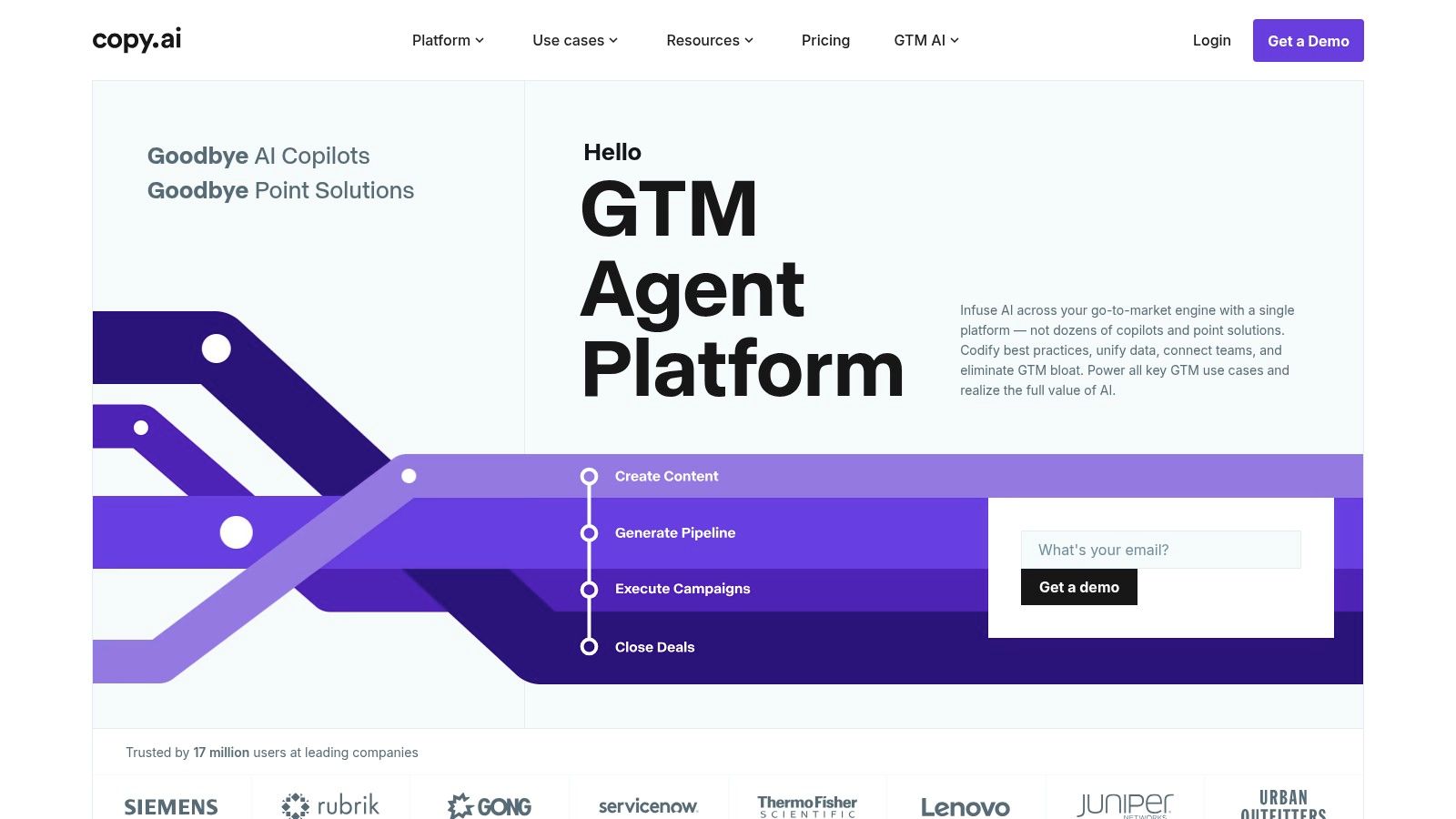
This platform’s true power lies in its workflow automation, which connects content creation with operational processes. For instance, a user can build a workflow that automatically scrapes a list of prospects from a URL, enriches their data, drafts personalized outreach emails for each one, and then pushes that content into a CRM. This moves beyond simple AI writing into operational efficiency, making it ideal for sales and marketing teams looking to scale their outreach and content production in a cohesive, automated fashion. Training your own AI agent is also a significant step forward, similar in concept to the custom GPTs highlighted in the launch of the GPT Store.
Key Features & Use Cases
- Content Agent Studio: Train custom AI agents on your brand’s unique voice, style guides, and product catalogs to generate perfectly aligned marketing copy.
- Workflow Automation: Build and automate multi-step processes like lead research, personalized email drafting, and content repurposing using a system of monthly credits.
- Multi-Model Access: Leverages a suite of leading AI models (including from OpenAI, Anthropic, and Google Gemini) to ensure the best possible output for any given task.
Pricing & Onboarding
Copy.ai offers a straightforward pricing structure with a free tier for individuals and paid plans for teams. The paid plans are primarily differentiated by user seats and the number of monthly workflow credits. The interface is user-friendly, making onboarding relatively simple, especially for its core content creation features.
| Free | Pro | Team |
|---|---|---|
| Best for: Individuals trying the tool | Best for: Small teams & solopreneurs | Best for: Growing marketing & sales teams |
| Price: $0 | Price: ~$49/mo | Price: ~$249/mo |
| Key AI Limit: 2,000 words & limited credits | Key AI Limit: 500 workflow credits | Key AI Limit: 3,000 workflow credits |
Pros:
- Excellent blend of high-quality content creation and powerful workflow automation.
- Simple pricing plans make it accessible for small teams to get started.
Cons:
- Workflow credit usage can scale quickly, potentially requiring a plan upgrade.
- Lacks the deep SEO and analytics features of all-in-one marketing suites.
Website: https://copy.ai
6. Adobe Marketo Engage
Adobe Marketo Engage is an enterprise-level marketing automation platform supercharged by Adobe Sensei, its proprietary AI and machine learning framework. It stands apart by moving beyond simple automation rules to enable truly predictive marketing. Rather than relying solely on past behavior, Marketo uses AI to forecast future actions, allowing marketers to build intelligent audience segments and deliver personalized content before a user even knows they need it. This makes it one of the most powerful digital marketing AI tools for B2B and enterprise organizations.
The platform's strength lies in its deep integration with the broader Adobe ecosystem. Marketers can leverage AI-powered tools like Adobe Firefly and Adobe Express to generate and personalize creative assets, then use Marketo's predictive capabilities to deploy them in real-time. This creates a seamless workflow from creative ideation to intelligent, personalized delivery at scale, something standalone tools struggle to match. Its AI models analyze complex customer journeys to score leads and identify the optimal content to show next.
Key Features & Use Cases
- Predictive Audiences: Utilizes AI scoring and filtering to identify audiences most likely to convert, unsubscribe, or engage. This allows for proactive campaign adjustments and highly targeted nurturing streams.
- Predictive Content: Automatically recommends and serves the most relevant content assets (from emails to website banners) to individual users in real-time based on their profile and predictive scores.
- Dynamic Chat: Powers AI-driven conversational marketing on websites, personalizing interactions and qualifying leads automatically based on visitor data and behavior.
Pricing & Onboarding
Adobe Marketo Engage does not offer public pricing; it requires direct sales engagement for a custom quote based on database size and feature set. It's a premium, enterprise-grade solution. Implementation is a significant undertaking, often requiring dedicated teams or implementation partners, and the platform has a substantial learning curve due to its depth and complexity.
| Growth | Select | Prime | Ultimate |
|---|---|---|---|
| Best for: Growing B2B teams | Best for: Mid-market companies | Best for: Enterprise-level marketing | Best for: Advanced enterprises |
| Price: Custom Quote | Price: Custom Quote | Price: Custom Quote | Price: Custom Quote |
| Key AI Limit: Foundational AI features | Key AI Limit: Predictive Audiences | Key AI Limit: Predictive Content | Key AI Limit: Journey analytics AI |
Pros:
- Powerful, scalable enterprise governance and security.
- Native integration with Adobe creative and analytics clouds.
Cons:
- Pricing is not transparent and is at a high enterprise level.
- Requires significant implementation time and specialized training.
Website: https://business.adobe.com/products/marketo/marketo.html
7. Mailchimp
Mailchimp has cemented its reputation as a go-to email marketing platform for small and medium-sized businesses, and its recent integration of generative AI solidifies its spot as a key player. Instead of focusing on complex data science, Mailchimp leverages AI to make sophisticated marketing accessible. The platform’s AI tools help users write more effective subject lines, generate email copy from a few prompts, and even suggest optimal send times, turning it into a powerful assistant for resource-strapped marketing teams.
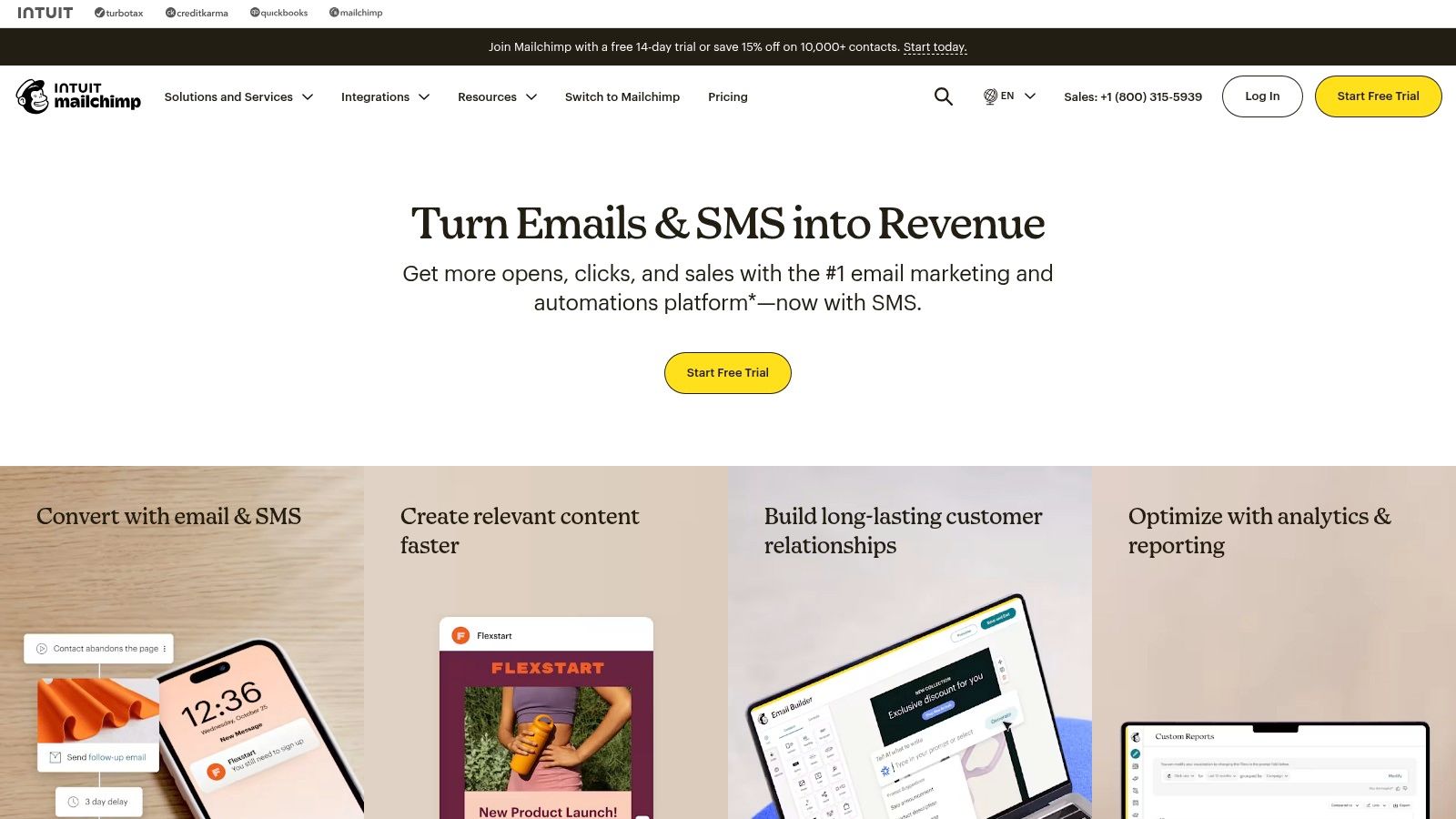
What sets Mailchimp apart is how seamlessly it embeds AI into the familiar email creation and marketing automation workflow. For instance, the Customer Journey builder uses AI to suggest logic and next steps, helping users build complex automation sequences that might have previously seemed daunting. This practical application of digital marketing AI tools helps businesses create more personalized and effective campaigns without a steep learning curve.
Key Features & Use Cases
- Generative AI Content: Quickly create entire email campaigns, from subject lines to body copy, by providing a few simple prompts. The AI can adapt the tone to match your brand voice.
- Predictive Segmentation: Uses AI to identify and group contacts who are most likely to purchase or engage, allowing for highly targeted and effective campaigns.
- AI-Assisted Customer Journeys: The journey builder provides intelligent recommendations for automation paths, helping you create sophisticated workflows for welcoming new subscribers, recovering abandoned carts, and re-engaging customers.
Pricing & Onboarding
Mailchimp’s pricing is based on the number of contacts and the feature tier. It offers a free plan for up to 500 contacts, making it highly accessible. Paid plans (Essentials, Standard, and Premium) unlock more advanced features like A/B testing, predictive segmentation, and advanced automation. Onboarding is straightforward thanks to its famously user-friendly interface and extensive knowledge base.
| Essentials | Standard | Premium |
|---|---|---|
| Best for: Small-scale email marketers | Best for: Growing businesses needing automation | Best for: Larger teams needing advanced features |
| Price: ~$13/mo (500 contacts) | Price: ~$20/mo (500 contacts) | Price: ~$350/mo (10k contacts) |
| Key AI Limit: Basic AI content generator | Key AI Limit: Predictive Segmentation | Key AI Limit: Advanced comparative reporting |
Pros:
- Extremely user-friendly with a low barrier to entry.
- Transparent contact-based pricing with a generous free plan.
- Practical and well-integrated AI features for email and automation.
Cons:
- Costs can escalate quickly as your contact list grows.
- Lacks the deep, enterprise-level data unification of more advanced CRMs.
Website: https://mailchimp.com
8. Hootsuite
Hootsuite is a veteran in the social media management space, but it has adeptly integrated AI to maintain its relevance and power. Rather than being a standalone AI generator, it embeds digital marketing AI tools directly into the social media manager's workflow. This approach focuses on enhancing efficiency and creativity, helping users draft better content faster and post it at the most opportune times. Its OwlyWriter AI, for example, generates captions, post ideas, and relevant hashtags with a few simple prompts.
What sets Hootsuite apart is its focus on practical, workflow-integrated AI within a mature, team-oriented platform. The AI doesn't just generate text; it suggests the optimal times to publish content based on historical performance data, taking the guesswork out of audience engagement. This blend of creative assistance and analytical insight makes it a powerful ally for social media teams aiming to scale their content production and impact without getting bogged down in manual tasks.
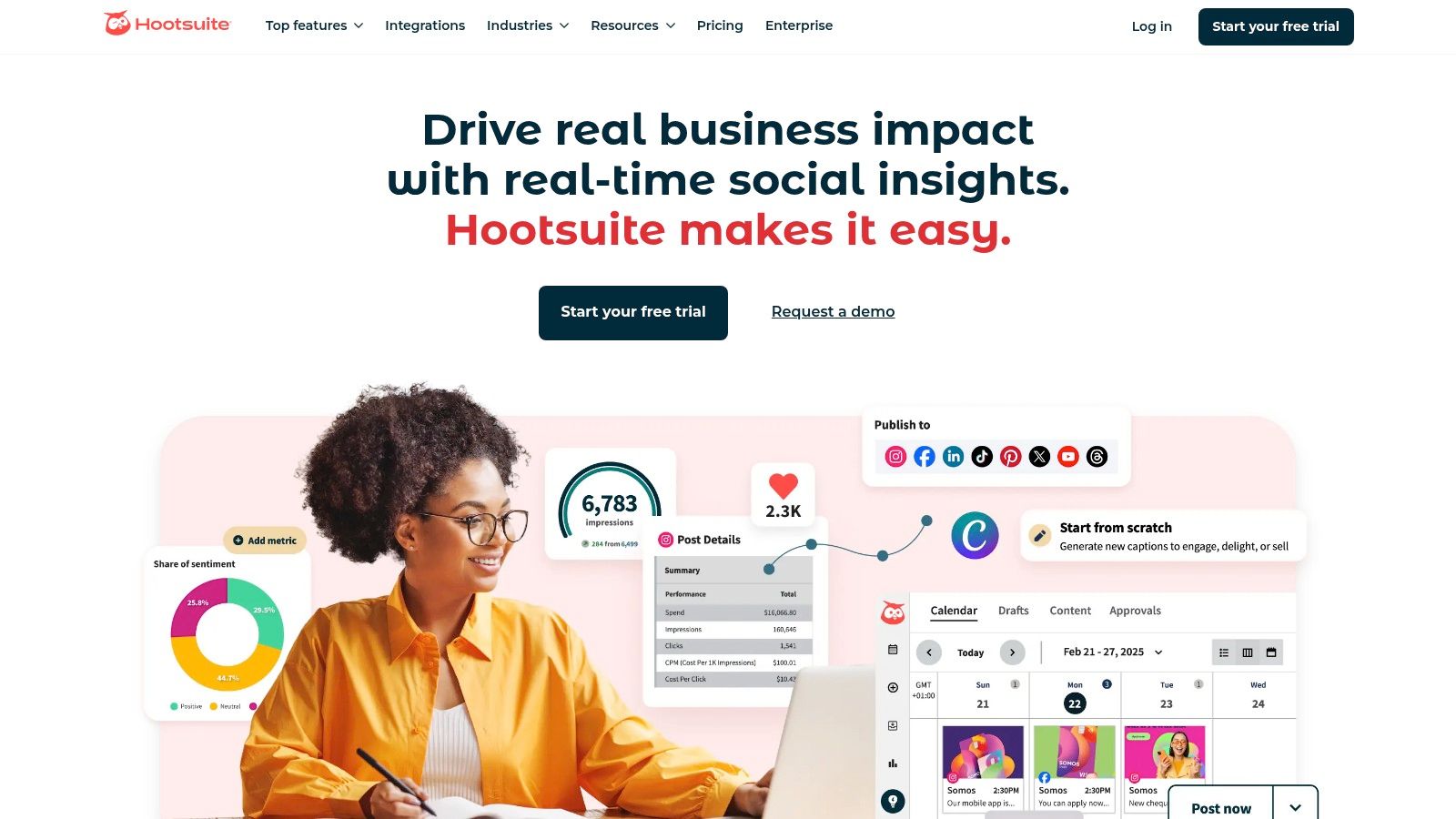
Key Features & Use Cases
- OwlyWriter AI: A built-in assistant that generates social media captions, hashtags, and creative post ideas from a simple prompt, helping to overcome writer's block.
- Best Time to Post Recommendations: Uses AI to analyze your account's past engagement and suggests the optimal times to schedule posts for maximum reach and interaction.
- Unified Social Inbox: While not purely AI, it uses smart logic to help teams manage comments and messages across all channels from one dashboard, improving response times.
Pricing & Onboarding
Hootsuite offers several subscription tiers, with pricing that can be less transparent upfront compared to competitors. The plans generally start with a Professional tier for individuals and scale up to Team and Enterprise solutions for larger organizations. A free trial is typically available. The interface is user-friendly, making onboarding relatively smooth for those familiar with social media dashboards.
| Professional | Team | Enterprise |
|---|---|---|
| Best for: Solopreneurs & freelancers | Best for: Small marketing teams | Best for: Large organizations & agencies |
| Price: ~$99/mo | Price: ~$249/mo | Price: Custom quote |
| Key AI Limit: Basic OwlyWriter AI access | Key AI Limit: Expanded AI credits & team features | Key AI Limit: Full suite & advanced analytics |
Pros:
- Mature, all-in-one platform for social media scheduling, monitoring, and analytics.
- AI features are seamlessly integrated into the existing workflow.
Cons:
- Advanced AI, listening, and reporting features are often locked behind higher-tier plans.
- The pricing structure can be complex and less transparent than some alternatives.
Website: https://hootsuite.com
9. Canva (Magic Studio)
Canva has transformed from a simple design tool into a comprehensive creative powerhouse, and its Magic Studio suite firmly establishes it as one of the most accessible digital marketing AI tools available. It integrates a variety of AI-driven features directly into its user-friendly design interface, empowering marketers and teams without specialized design skills to produce professional-grade visuals, videos, and copy at remarkable speed. The platform's strength lies in making AI practical and immediately applicable to everyday marketing tasks.
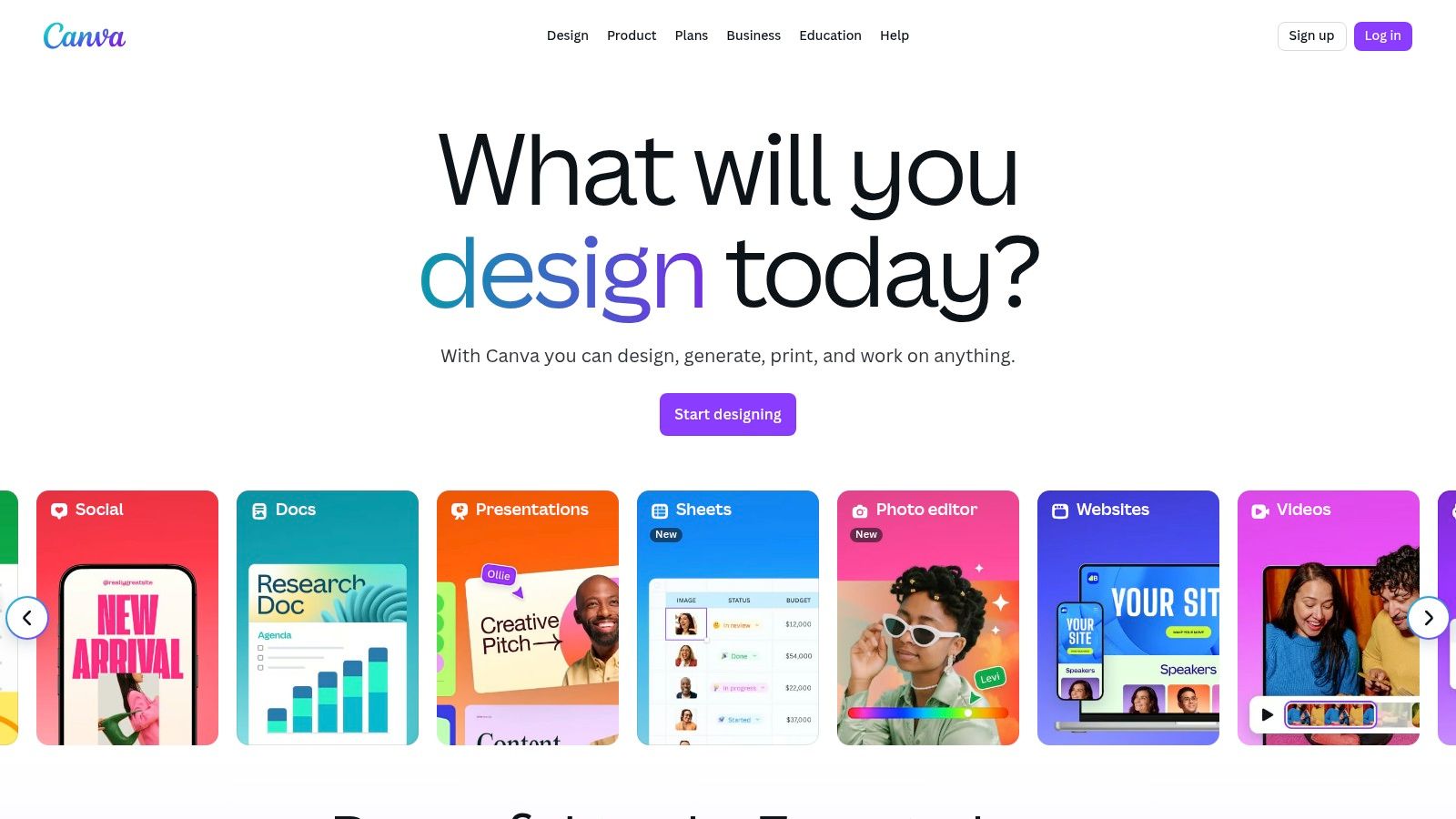
Unlike standalone AI generators, Magic Studio’s tools are embedded within a familiar creative workflow. You can generate an entire presentation from a simple prompt with Magic Design, create on-brand copy variations with Magic Write, or use Text to Image to produce custom assets that perfectly fit your existing project. This seamless integration removes the friction of switching between multiple applications, making it a go-to solution for creating cohesive social media campaigns, marketing presentations, and branded documents.
Key Features & Use Cases
- Magic Write & Magic Design: Instantly generate drafts of marketing copy or full presentations, social media posts, and videos from a text prompt, which can then be edited and refined.
- Text to Image & Video: Create unique, custom images and short video clips directly within the Canva editor to fill creative gaps without relying on stock media.
- Magic Switch & Magic Edit: Magically transform the format of a design (e.g., a presentation into a blog post) or edit specific objects within an image using simple text commands.
Pricing & Onboarding
Canva offers a robust free tier, but the powerful Magic Studio features are primarily available in its paid plans. Canva Pro is designed for individuals, while Canva for Teams is built for collaboration. The AI tools often operate on a credit system, with monthly allowances that vary by plan. The platform is famously intuitive, with virtually no learning curve for basic use.
| Canva Free | Canva Pro | Canva for Teams |
|---|---|---|
| Best for: Individuals, basic use | Best for: Freelancers, creators | Best for: Marketing teams & businesses |
| Price: Free | Price: ~$15/mo | Price: ~$30/mo (per user) |
| Key AI Limit: Limited Magic Studio credits | Key AI Limit: Generous but finite credits | Key AI Limit: Highest credit allowance, collaboration tools |
Pros:
- Extremely easy to use, making AI-powered creation accessible to non-designers.
- All-in-one platform for design, copy, video, and social media scheduling.
Cons:
- AI features are subject to credit limits which can be restrictive for heavy users.
- The pricing and credit allowances for teams have been known to change.
Website: https://canva.com
10. Google Ads (including Performance Max)
Google Ads has transformed from a manual bidding platform into one of the most powerful digital marketing AI tools available, largely through its Performance Max (PMax) campaigns. This campaign type leverages Google's machine learning to automate bidding, targeting, and ad creation across its entire advertising ecosystem, including YouTube, Display, Search, Discover, and Gmail. It consolidates management, allowing advertisers to feed the algorithm their goals, budget, and creative assets, and then letting the AI find the most efficient paths to conversion.
This approach makes Google Ads an indispensable tool for marketers looking to achieve scale without granular, hands-on management. The AI analyzes countless user signals in real time to serve the right ad to the right person at the optimal moment. While this "black box" nature can be daunting, its ability to process data and optimize on a scale humans cannot match is undeniable, making it a cornerstone of modern PPC strategy. The platform is also increasingly integrating models like Gemini to enhance its creative and optimization capabilities, which you can learn more about by reading this overview of Google Gemini and its features.
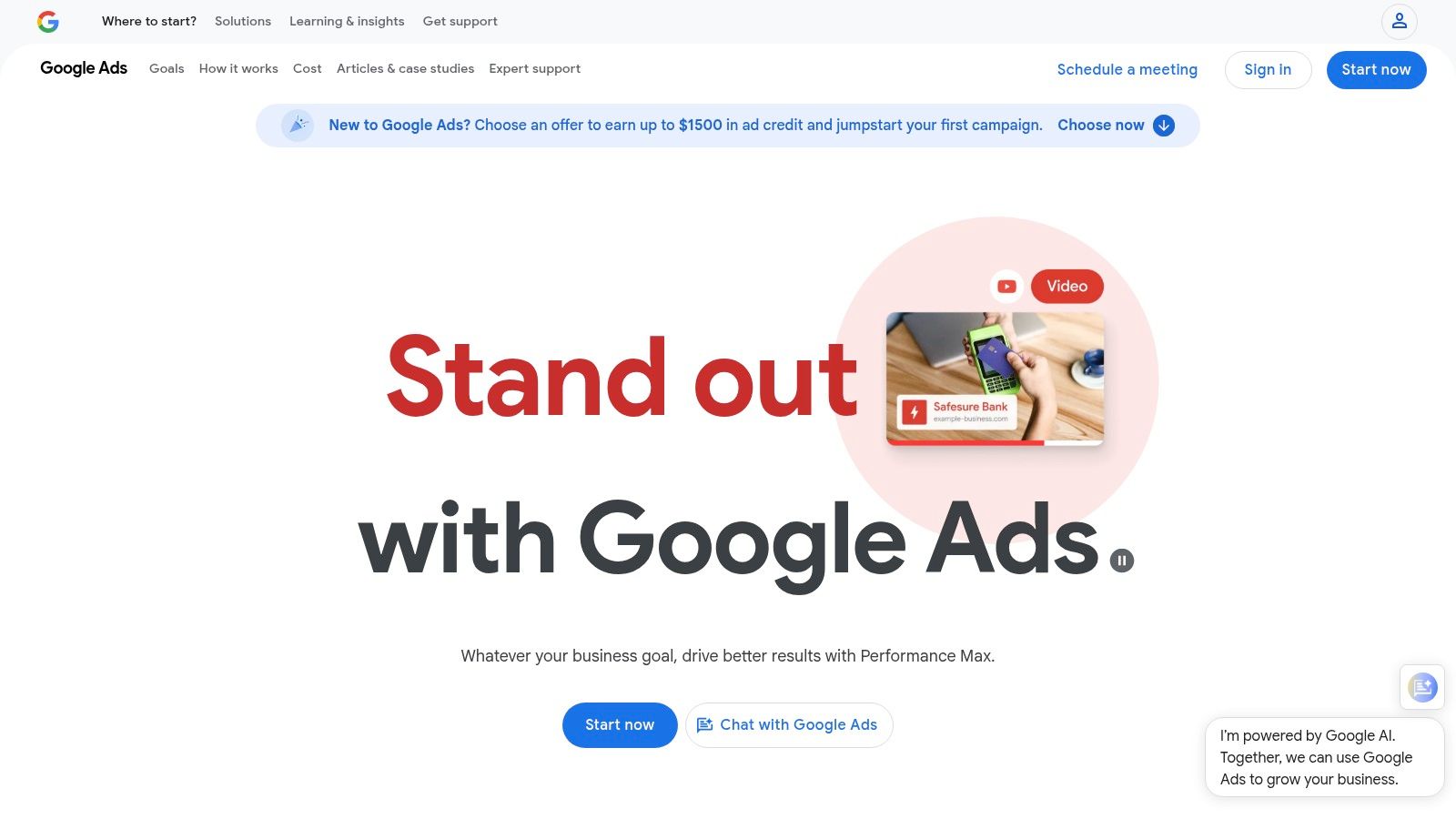
Key Features & Use Cases
- Performance Max Campaigns: Upload creative assets (text, images, video) and set conversion goals. The AI automatically mixes and matches assets to create and serve ads across all of Google's channels.
- Goal-Based Bidding: Instead of manual CPC bids, you optimize for specific outcomes like conversions, conversion value (ROAS), or clicks. The AI handles the real-time bidding to achieve these goals efficiently.
- Audience Signals: Guide the AI by providing first-party data (customer lists, website visitors) and custom segments. The system uses these signals as a starting point to find new, high-converting audiences.
Pricing & Onboarding
Google Ads operates on a flexible pay-per-click (PPC) or pay-per-impression (CPM) model. There is no subscription fee; you only pay when someone interacts with your ad. Budgets are fully customizable and can be started, stopped, or adjusted at any time. Onboarding is straightforward, but mastering the platform, especially AI-driven campaigns, requires a strategic understanding of goal setting and asset quality. To truly leverage AI for efficiency in your campaigns, consider exploring the top 12 Best Google Ads Automation Tools for 2025 to boost efficiency and cut costs.
| Model | Control | AI Reliance |
|---|---|---|
| Best for: Small budgets, new users | Best for: Most advertisers seeking scale | Best for: Specific channel control |
| Price: Pay-per-click/impression | Price: Pay-per-click/impression | Price: Pay-per-click/impression |
| Campaign Types: Search, Display | Campaign Type: Performance Max | Campaign Types: Video, Shopping |
Pros:
- Unmatched reach across the entire Google ecosystem.
- Flexible budget control with the ability to start and stop campaigns anytime.
Cons:
- The AI's "black box" optimization can be opaque, requiring trust in the algorithm.
- Lead quality can be variable and requires careful monitoring and filtering.
Website: https://ads.google.com
11. Salesforce Marketing Cloud
Salesforce Marketing Cloud stands as an enterprise-grade behemoth, integrating powerful digital marketing AI tools across its entire customer relationship management (CRM) ecosystem. Its core strength lies in its AI engine, Einstein, which powers everything from predictive analytics to personalized customer journeys. This isn't a standalone tool but a comprehensive platform designed to manage and automate marketing efforts at a massive scale, using AI to understand customer behavior and orchestrate complex, multi-channel campaigns.
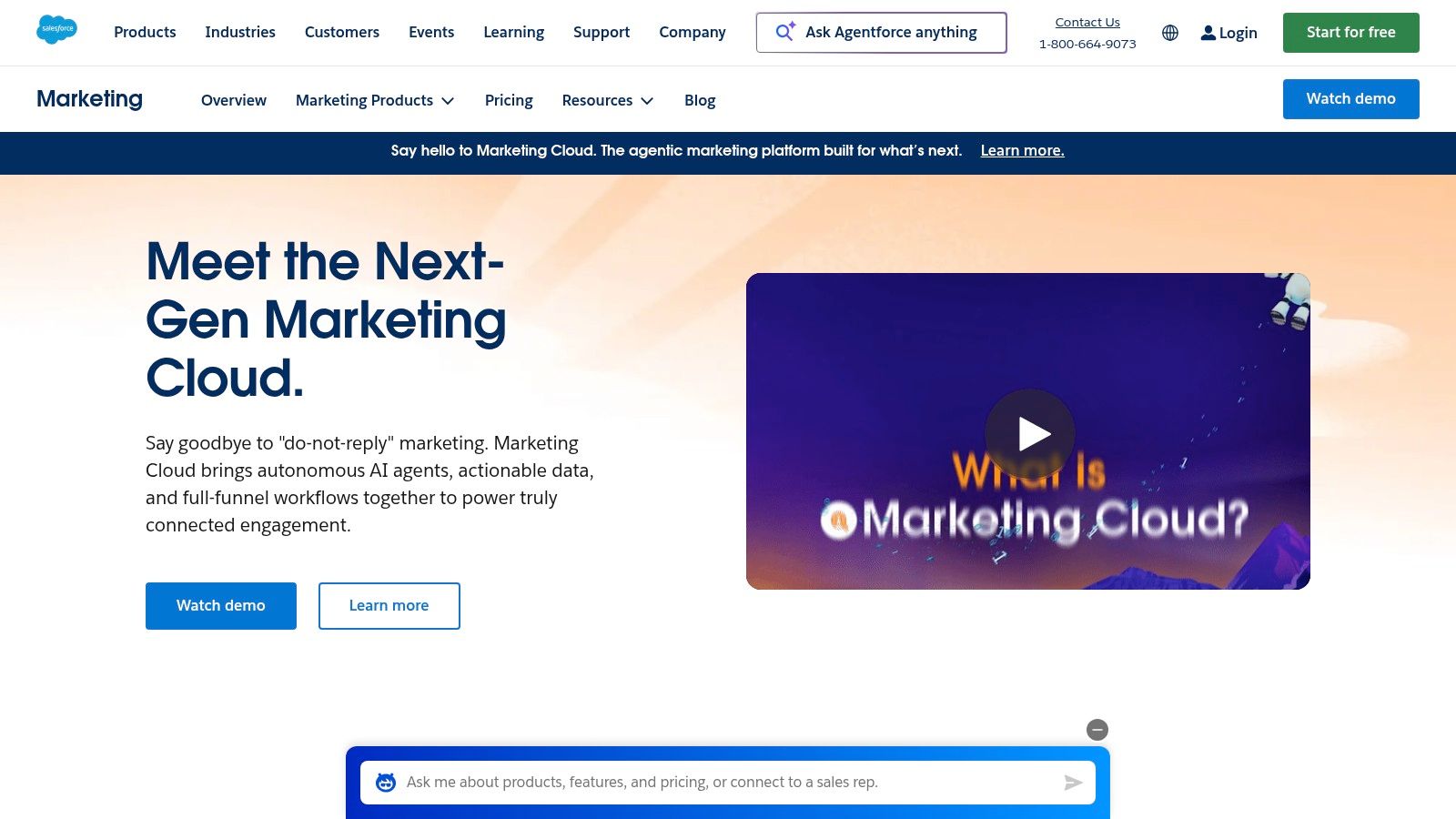
What sets Salesforce apart is its deep integration with sales and service data, allowing its AI to create a unified view of the customer. The platform uses Einstein for agentic campaign creation, where AI can suggest and even build entire customer journeys based on specific goals. It also provides sophisticated personalization engines that deliver tailored content, product recommendations, and offers in real-time across email, mobile, social, and advertising channels.
Key Features & Use Cases
- Einstein Engagement Scoring: Uses AI to predict how likely each contact is to engage with emails, push notifications, and other messages, allowing marketers to segment audiences for maximum impact.
- Journey Builder with AI: Orchestrates complex customer journeys across multiple touchpoints. Einstein can optimize paths, timing, and channel selection automatically based on real-time customer behavior.
- Personalization and Recommendation Engines: Delivers AI-driven product and content recommendations on websites, in-app, and via email to increase conversion rates and average order value.
Pricing & Onboarding
Salesforce offers several editions with publicly available pricing, though contracts are typically annual. The entry-level "Pro" edition starts around $1,250 per month, billed annually. Higher tiers like "Corporate" and "Enterprise" add more advanced AI features, analytics, and greater capacity. Implementation is often complex, requiring significant data integration and technical expertise, making it best suited for large organizations with dedicated teams.
| Pro | Corporate | Enterprise |
|---|---|---|
| Best for: Businesses needing core email marketing & journeys | Best for: Larger teams needing journey automation & analytics | Best for: Large-scale, multi-brand organizations |
| Price: ~$1,250/mo | Price: ~$4,200/mo | Price: Contact Sales |
| Key AI Feature: Einstein Send Time Optimization | Key AI Feature: Einstein Engagement Scoring | Key AI Feature: Advanced Einstein Insights |
Pros:
- Comprehensive, all-in-one platform tightly integrated with a world-class CRM.
- Extremely powerful and scalable AI capabilities for enterprise-level marketing.
Cons:
- High starting price and typically requires annual contracts.
- Can be very complex to implement and manage without specialized resources.
Website: https://salesforce.com/marketing
12. AWS Marketplace (Advertising & Marketing + AI Agents)
For organizations already embedded in the Amazon Web Services ecosystem, the AWS Marketplace is less a single tool and more a strategic procurement hub for a vast array of digital marketing AI tools. Instead of offering a proprietary solution, it serves as a curated catalog where businesses can find, purchase, and deploy third-party AI-powered marketing software directly through their existing AWS account. This massively simplifies billing, vendor management, and compliance for enterprise teams.
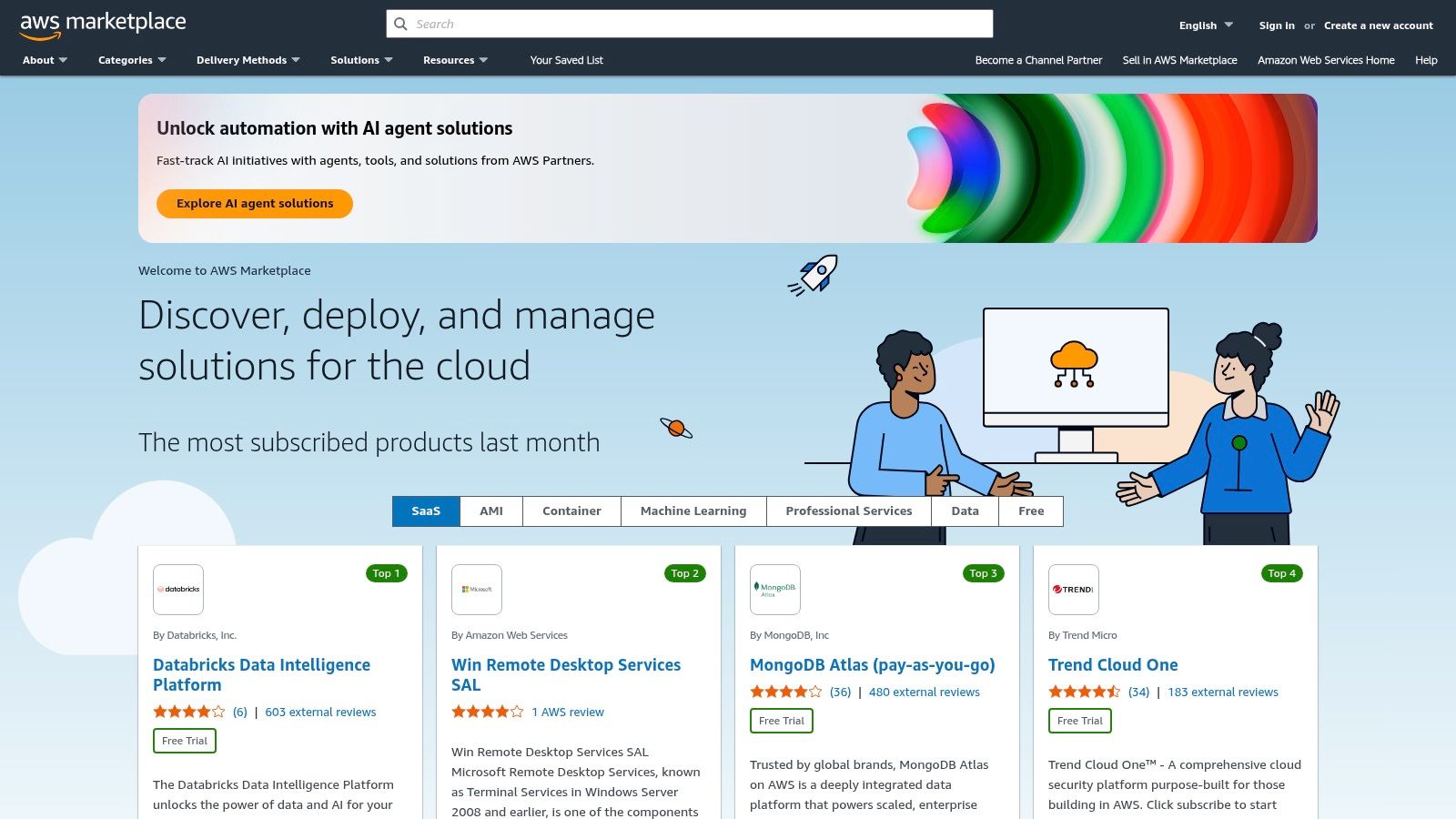
The platform’s strength lies in its sheer breadth, covering everything from generative AI for content creation to sophisticated AI agents for customer service automation and personalization engines. It allows teams to test and integrate cutting-edge AI solutions from various vendors without the usual procurement friction. Marketers can discover specialized tools for omnichannel campaigns, data analytics, and customer journey optimization, all designed to run on the AWS infrastructure they already trust.
Key Features & Use Cases
- Curated Listings: Explore a pre-vetted selection of tools across categories like Advertising & Marketing Technology, Machine Learning, and AI Agents, ensuring compatibility and security.
- Flexible Pricing Models: Access various pricing options, including free trials, pay-as-you-go, annual subscriptions, and private offers, allowing you to test tools before committing.
- One-Click SaaS Subscriptions: Instantly subscribe to and deploy powerful marketing platforms, with all usage costs consolidated into a single AWS bill.
Pricing & Onboarding
Pricing is entirely dependent on the individual vendor listings within the marketplace. Models range from free to enterprise-level contracts costing thousands per month. The primary benefit is unified billing through your AWS account. Onboarding also varies by vendor, but deployment is often streamlined as the tools are built to integrate with the AWS environment, reducing technical setup hurdles for development teams.
| Free Tier / Trials | Pay-As-You-Go | Annual Subscriptions |
|---|---|---|
| Best for: Testing & evaluation | Best for: Startups & variable usage | Best for: Enterprises & established teams |
| Price: Varies (often limited) | Price: Varies (usage-based) | Price: Varies (fixed annual cost) |
| Key AI Limit: Vendor-specific trial limits | Key AI Limit: Vendor-specific API calls | Key AI Limit: Full platform access |
Pros:
- Streamlined procurement and compliance for companies already using AWS.
- Broad selection of AI tools, from content creation to complex personalization engines.
Cons:
- Pricing and feature sets vary widely between different vendor listings.
- Primarily beneficial if your company's software stack already runs on AWS.
Website: https://aws.amazon.com/marketplace
Top 12 Digital Marketing AI Tools Comparison
| Platform | Core Features / Capabilities | User Experience / Quality ★ | Value Proposition 💰 | Target Audience 👥 | Unique Selling Points ✨ |
|---|---|---|---|---|---|
| PromptDen 🏆 | Multi-modal AI prompts (text, image, video), Marketplace | ★★★★☆ Active community, helpful resources | Flexible marketplace pricing, creator monetization | AI practitioners, creators, marketers | PromptForge tool, Browser extensions, multi-model support |
| Semrush | AI-powered SEO, keyword research, content optimization | ★★★★☆ Trusted dataset, competitive intel | Tier-based pricing with add-ons | SEO/SEM professionals | Deep SEO data, broad App Center |
| HubSpot Marketing Hub | CRM-native AI content and social automation | ★★★★☆ Unified marketing & sales data | Scales free to enterprise, contact-based pricing | SMB to enterprise marketing teams | Integrated CRM + AI agents |
| Jasper | AI content creation with brand voice control | ★★★★☆ Brand consistency, campaign orchestration | Per seat pricing, free trial | Marketing teams focused on brand governance | AI marketing agents, no-code AI apps |
| Copy.ai | AI writing + workflow automation | ★★★☆☆ Simple, efficient for small teams | Subscription plans, may need upgrades | Small marketing & sales teams | Multiple AI models, workflow credits |
| Adobe Marketo Engage | Enterprise AI marketing automation + Adobe creative integrations | ★★★★☆ Scalable governance, creative tool integration | Custom pricing, sales engagement required | Large enterprises | Adobe Sensei AI, predictive content personalizations |
| Mailchimp | AI-driven email & marketing automation | ★★★☆☆ Easy for SMBs, tiered pricing | Contact-based pricing, free trials | SMBs focused on email/SMS marketing | Generative AI content, advanced automation |
| Hootsuite | Social media AI tools, scheduling, analytics | ★★★☆☆ Mature platform, scheduling & analytics | Pricing unclear upfront | Social media managers and teams | AI caption/hashtag assistants, unified inbox |
| Canva (Magic Studio) | AI-powered design, video, content creation | ★★★★☆ Fast, easy for non-designers | Usage limits on AI, fluctuating pricing | Marketing teams, content creators | Magic Write/Design, brand kits, multi-format export |
| Google Ads | AI campaign optimization across Google properties | ★★★★☆ Massive reach, flexible budget control | PPC-based spending, no fixed pricing | Advertisers of all sizes | Performance Max, multi-channel AI optimizations |
| Salesforce Marketing Cloud | AI-driven customer journeys, personalization, analytics | ★★★★☆ Enterprise-grade, advanced capabilities | Published pricing, high cost | Enterprise marketers | Agentforce & Einstein AI engines, B2B account engagement |
| AWS Marketplace (Ad & AI) | AI marketing SaaS procurement and billing | ★★★☆☆ Varied listings, dependent on chosen software | Usage-based, private offers, flexible | AWS-centric businesses | Streamlined procurement, broad AI marketing tool selection |
Choosing the Right AI Tool for Your Marketing Goals
The landscape of digital marketing has fundamentally shifted, and as we've explored, AI is no longer a futuristic concept but a present-day necessity for staying competitive. From crafting compelling ad copy with Jasper to automating complex customer journeys with Salesforce Marketing Cloud, the power of artificial intelligence is reshaping what's possible. This comprehensive list of digital marketing AI tools demonstrates the breadth of innovation available, touching every corner of the modern marketing stack.
The key takeaway is that there is no single "best" AI tool. The right choice is entirely dependent on your specific context: your team's size, your budget, your existing technology ecosystem, and most importantly, your strategic goals. A solo creator might find the perfect blend of content creation and design in Canva's Magic Studio, while a large enterprise will gravitate towards the robust, data-driven automation of Adobe Marketo Engage.
How to Select Your AI Marketing Toolkit
Making an informed decision requires moving beyond feature lists and focusing on strategic fit. As you evaluate these platforms, consider a structured approach to ensure you're choosing a solution that will deliver tangible ROI and integrate smoothly into your operations.
Here are the critical factors to guide your selection process:
- Identify Your Primary Bottleneck: Where is your team spending the most time on low-impact tasks? Is it content creation, data analysis, lead nurturing, or social media management? Pinpoint your biggest challenge and start by looking for a tool that solves that specific problem. For instance, if content velocity is your issue, a generative AI tool like Copy.ai is a logical starting point.
- Assess Integration Capabilities: Your new AI tool must coexist with your current software. A powerful platform that doesn't connect to your CRM, analytics dashboard, or email service provider will create more problems than it solves. Always check for native integrations or robust API access to ensure a seamless flow of data.
- Consider Scalability and Future Needs: Think about where your business will be in one or two years. Will your chosen tool grow with you? A platform like HubSpot Marketing Hub is designed to scale from a small startup's needs to a large corporation's complex demands, making it a safe long-term investment. Don't choose a tool that you'll outgrow in six months.
- Evaluate the Learning Curve and Team Adoption: The most advanced tool is useless if your team can't or won't use it. Consider the user interface, available training resources, and the level of technical expertise required. Tools like Mailchimp and Hootsuite have built their reputation on user-friendliness, which can be a deciding factor for teams without dedicated IT support.
From Implementation to Strategic Advantage
Once you've made your selection, the journey is just beginning. Successful implementation is about more than just setting up an account; it's about integrating the tool into your core workflows and empowering your team to leverage its full potential. For a broader perspective on current industry options and how they integrate into a cohesive strategy, explore the top marketing automation platforms for B2B in 2025, many of which now include AI capabilities.
The true power of these digital marketing AI tools is unlocked when they are used not just to automate old processes, but to invent new, more effective ones. The goal is to move from simply doing things faster to doing them smarter, using AI-driven insights to make better decisions and create more personalized, impactful customer experiences. The future of marketing isn't about replacing human creativity; it's about amplifying it with intelligent technology.
Ready to elevate your AI-powered marketing content from the ground up? The quality of your output depends directly on the quality of your input, and that starts with the prompt. Join PromptDen, the ultimate marketplace and community for discovering, sharing, and mastering the prompts that power the world's leading digital marketing AI tools. Explore our library today and find the perfect prompt to unlock your next big campaign at PromptDen.